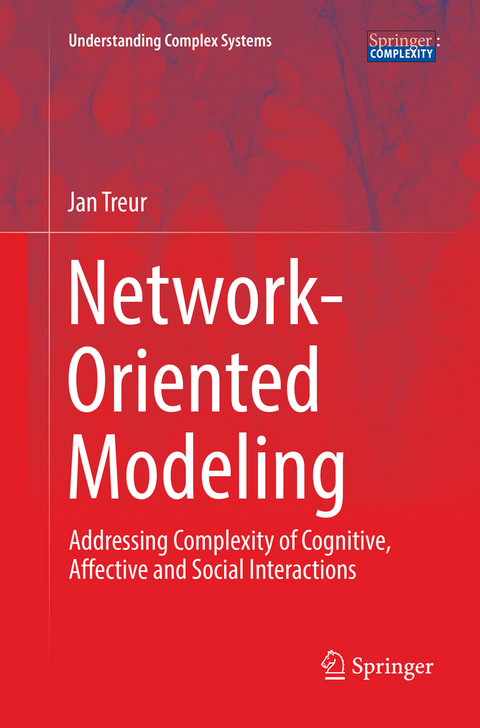
Network-Oriented Modeling
Springer International Publishing (Verlag)
978-3-319-83240-1 (ISBN)
This book presents a new approach that can be applied to complex, integrated individual and social human processes. It provides an alternative means of addressing complexity, better suited for its purpose than and effectively complementing traditional strategies involving isolation and separation assumptions.
Network-oriented modeling allows high-level cognitive, affective and social models in the form of (cyclic) graphs to be constructed, which can be automatically transformed into executable simulation models. The modeling format used makes it easy to take into account theories and findings about complex cognitive and social processes, which often involve dynamics based on interrelating cycles. Accordingly, it makes it possible to address complex phenomena such as the integration of emotions within cognitive processes of all kinds, of internal simulations of the mental processes of others, and of social phenomena such as shared understandings and collective actions. A variety of sample models - including those for ownership of actions, fear and dreaming, the integration of emotions in joint decision-making based on empathic understanding, and evolving social networks - illustrate the potential of the approach. Dedicated software is available to support building models in a conceptual or graphical manner, transforming them into an executable format and performing simulation experiments. The majority of the material presented has been used and positively evaluated by undergraduate and graduate students and researchers in the cognitive, social and AI domains.
Given its detailed coverage, the book is ideally suited as an introduction for graduate and undergraduate students in many different multidisciplinary fields involving cognitive, affective, social, biological, and neuroscience domains.
Prof. Jan Treur, Faculty of Sciences, the Vrije Universiteit (VU) in Amsterdam, is the head of the Behavioural Informatics Group. This multidisciplinary group investigates methods and techniques for modelling and analysis of complex human and social processes. Such models are applied to design human- or socially aware applications that support humans or groups of humans in their daily functioning, for example, in the form of smartphone apps or specialized social media. Application areas include support for a healthy lifestyle, active lifestyle, ambient-assisted living, crowd behavior, virtual patients, chronic diseases, and mental disorders such as depression, post-traumatic stress disorders, or autism spectrum disorders. Among Prof. Treur's research interests are Complex Adaptive Systems, Computational Modelling, Human-Aware and Socially Aware Computing, Ambient Intelligence, Social Networks, Socio-Technical Systems, Cognitive, Affective and Social Neuroscience, Biological or Biologically Inspired Modelling, Social and Organization Modelling, and Philosophy of Mind. He has taken part in various National and EU Projects, was and is involved in many conferences as Program Committee Member, Chair or Keynote Speaker, and has more than 600 papers to his name. He has designed successful multidisciplinary curricula for Bachelor and Master programs in Lifestyle Informatics and Socially Aware Computing at his university. He has been and is teaching on modelling topics within these Bachelor and Master curricula and up to now has supervised well over 30 PhD theses within these areas. For further information we refer to the Author's website.
Preface.- Part I Network-Oriented Modeling: Introduction.- Network-Oriented Modelling and its Conceptual Foundations.- A Temporal-Causal Network Modeling Approach.- Part II Emotions all the Way.- How Emotions Come in between Everything.- How do you Feel Dreaming.- Dreaming your Fear away.- Emotions as a Vehicle for Rationality in Decision Making.- Part III Yourself and the Others.- From Mirroring to the Emergence of Shared Understanding and Collective Power.- Am I going to do this? Is it me who did this.- How Empathical are you.- Are you with me. Am I with you.- Changing yourself, Changing the Other, or Changing your Connection.- Part IV Analysis Methods for Temporal-Causal Network Models.- Where is this going.- What is Happening.- Who are you.- Part V Philosophical, Societal and Educational Perspectives.- We don't Believe in Ghosts, do we.- Making Smart Applications Smarter.- Multidisciplinary Education.- Part VI Network-Oriented Modelling: Discussion.- On the Use of Network-Oriented Modelling.- Index.
"This very interesting book considers a novel but important field of complex systems modeling involving human processes as a whole, and is of great use to researchers seeking to develop scientific models for human behavior, decision making, social interactions, including the complexities of human emotions, shared understanding, joint decision making and self-ownership." (Efstratios Rappos, zbMATH 1391.91005, 2018)
"The book is a collection of relatively independent chapters, each with its own bibliography. ... The volume will be of great interest to modeling practitioners and cognitive scientists, who will find great stimulation in the explanations it offers of various cognitive dynamics." (H. Van Dyke Parunak,Computing Reviews, July, 2018)
| Erscheint lt. Verlag | 22.4.2018 |
|---|---|
| Reihe/Serie | Understanding Complex Systems |
| Zusatzinfo | XVI, 499 p. 134 illus., 52 illus. in color. |
| Verlagsort | Cham |
| Sprache | englisch |
| Maße | 155 x 235 mm |
| Gewicht | 8662 g |
| Themenwelt | Mathematik / Informatik ► Informatik ► Theorie / Studium |
| Naturwissenschaften ► Physik / Astronomie ► Theoretische Physik | |
| Sozialwissenschaften ► Soziologie ► Empirische Sozialforschung | |
| Schlagworte | Approximating joint-decision processes • Arftifical Intelligence modelling • Cognitive and affective neuroscience • Cognitive science modelling • Complexity • Continuous-time networks • Data-driven Science, Modeling and Theory Building • Dynamic Networks • Neurocognitive models • Rationality of decision models • simulation theory of cognition • Social neuroscience models • Social psychology simulation software |
| ISBN-10 | 3-319-83240-9 / 3319832409 |
| ISBN-13 | 978-3-319-83240-1 / 9783319832401 |
| Zustand | Neuware |
| Haben Sie eine Frage zum Produkt? |
aus dem Bereich


